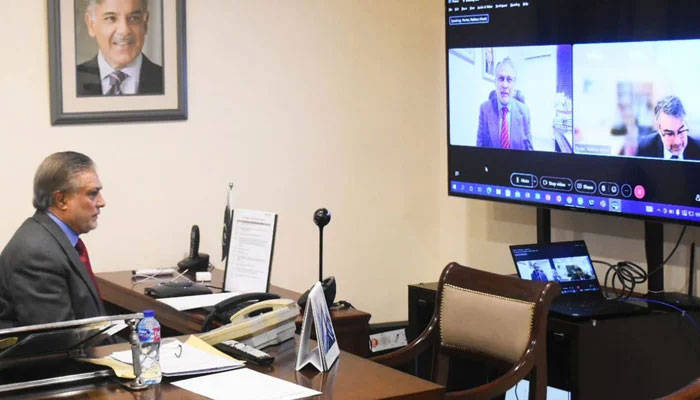Delay in IMF deal affects budget preparation
A meeting of the National Economic Council is scheduled to be held in the first week of May
ISLAMABAD: The delay in reaching an agreement with the International Monetary Fund (IMF) has affected the preparation of the budget for the upcoming fiscal year, sources told Geo News Saturday.
The Budget Strategy Paper (BSP), which was scheduled to be approved by the federal cabinet in the second week of April, has not been prepared due to the prevailing political and economic uncertainty.
The schedule for deciding the ceiling for development funds and current expenditure for the fiscal year 2024 has also been affected, while a meeting of the Annual Plan Coordination Committee (APCC) is yet to be held.
Meanwhile, a meeting of the National Economic Council is scheduled to be held in the first week of May.
Sources said the budget documents would be finalised by the last week of next month for approval by the cabinet. The government plans to present the budget for the upcoming year to the cabinet as well as parliament in the first week of June.
It is expected that the new budget would be “dictated” by the IMF, the sources said, adding that the Washington-based lender’s approval would be sought for tax revenues, fiscal deficit, public sector development programme funds and key targets.
The government has been in talks with the IMF since November for the release of a desperately-needed economic bailout, without which the country risks default.
The latest loan tranche, if approved, would disburse over $1 billion for Pakistan and unlock inflows from other multilateral institutions. The amount is part of a $6.5 billion Extended Fund Facility (EFF) agreed upon in 2019. Pakistan had to complete actions demanded by the IMF, such as reversing subsidies in power, export and farming sectors, hikes in the tariffs of energy and fuel, and a permanent power surcharge, among other measures. These steps included jacking up its key policy rate to an all-time high of 21%, adhering to a market-based exchange rate, arranging external financing and raising more than Rs170 billion ($613 million) in new taxes.
However, despite these measures, a staff-level agreement is yet to be signed with the Fund. The current IMF programme is going to expire on June 30, 2023, but the ongoing 9th Review has not yet been completed.
The 10th Review became due on February 3, 2023, while the last and final 11th Review would become due on May 3, 2023, i.e. in less than a week.
No one knows how both sides will proceed further as the 9th Review could not be concluded despite meeting all major conditions.
However, former finance minister Miftah Ismail, among others, has said that the country would need to enter a new programme with the international lender immediately after the current one ends due to its worsening economic situation.
-
 Heidi Klum Gushes Over Diplo Collab 'Red Eye' Despite DJ Falling Asleep During Video
Heidi Klum Gushes Over Diplo Collab 'Red Eye' Despite DJ Falling Asleep During Video -
 Israel Behind Majority Of Journalist Deaths Worldwide, Watchdog Claims
Israel Behind Majority Of Journalist Deaths Worldwide, Watchdog Claims -
 'It Would Become A Circus' : Inside Jane's Turmoil For 'little Sister' Fergie Whose Hidden From The World
'It Would Become A Circus' : Inside Jane's Turmoil For 'little Sister' Fergie Whose Hidden From The World -
 Inside Cardi B's Real Feelings Related To Stefon Diggs Split Post One Year Of Romance
Inside Cardi B's Real Feelings Related To Stefon Diggs Split Post One Year Of Romance -
 Former Sri Lankan Intelligence Chief Arrested Over 2019 Easter Bombings
Former Sri Lankan Intelligence Chief Arrested Over 2019 Easter Bombings -
 Kristen Bell Shares One Rule For 'SAG' Awards Ceremony That She Will Ditch This Time: 'Happy And Fun'
Kristen Bell Shares One Rule For 'SAG' Awards Ceremony That She Will Ditch This Time: 'Happy And Fun' -
 Woman Suing Meta Platforms, YouTube Over Social Media Addiction Sticks To Claims After Trial
Woman Suing Meta Platforms, YouTube Over Social Media Addiction Sticks To Claims After Trial -
 Shakira Applauded For 'gracious' Behaviour By Fans As She Blends Work With Family Downtime
Shakira Applauded For 'gracious' Behaviour By Fans As She Blends Work With Family Downtime -
 Prince William Hits The Roof With The Andrew Saga Bleeding Into Earthshot
Prince William Hits The Roof With The Andrew Saga Bleeding Into Earthshot -
 Mexico’s President Considers Legal Action Over Elon Musk Cartel Remark
Mexico’s President Considers Legal Action Over Elon Musk Cartel Remark -
 HBO Gives Major Update About 'Industry' Season Five And Show's End
HBO Gives Major Update About 'Industry' Season Five And Show's End -
 Donnie Wahlberg Responds To 'Boston Blue' Backlash: 'Nobody Was More Disappointed Than Me'
Donnie Wahlberg Responds To 'Boston Blue' Backlash: 'Nobody Was More Disappointed Than Me' -
 Jennifer Garner Gets Emotional Over Humble Career Start: 'It Makes Me Want To Cry'
Jennifer Garner Gets Emotional Over Humble Career Start: 'It Makes Me Want To Cry' -
 Princess Beatrice Told An Acquaintance That She ‘likes’ Jeffrey Epstein: Grim Verdict Drops
Princess Beatrice Told An Acquaintance That She ‘likes’ Jeffrey Epstein: Grim Verdict Drops -
 Late Katherine Short's Neighbours Give Insights Into Her 'peace Loving' Personality Post Suicide
Late Katherine Short's Neighbours Give Insights Into Her 'peace Loving' Personality Post Suicide -
 Fresh Details Of King Charles, Queen Camilla's US Visit Emerge Amid Andrew Investigation
Fresh Details Of King Charles, Queen Camilla's US Visit Emerge Amid Andrew Investigation




